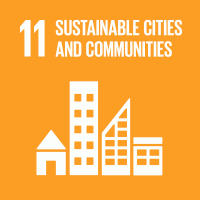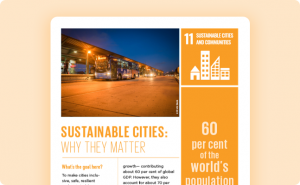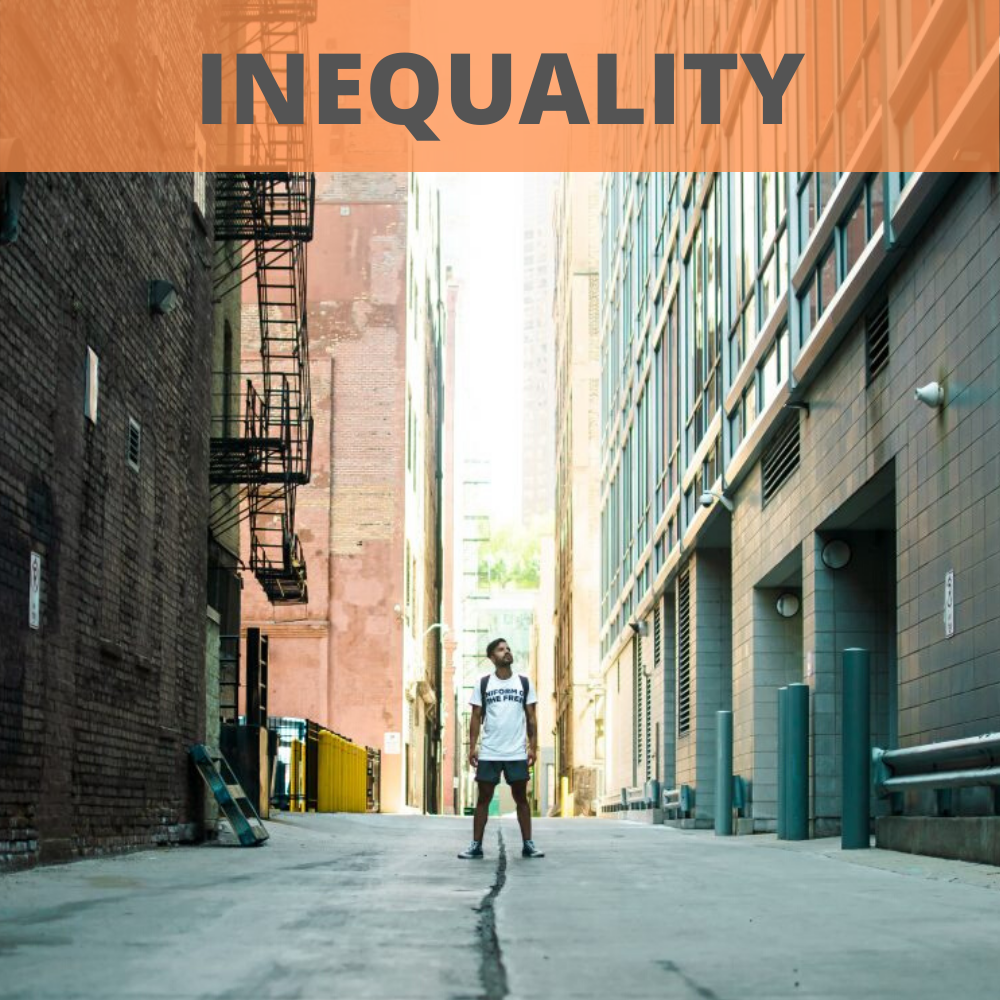Half the world’s population now lives in cities, and this is projected to increase to two-thirds by 2050, says UN-Habitat – the United Nations organization focused on advancing sustainable urbanization as a driver of development, peace and human rights.
Cities face massive environmental, socio-economic and spatial challenges. Although they can be a hub for economic development, cities can also exacerbate inequalities. But cities that are well-planned and well-governed can contribute significantly to addressing global challenges including poverty and climate change, leading the greening of the global economy and providing a safe and healthy environment for everyone.
Ahead of the 2020 World Urban Form, the Goal of the Month editorial looks at how cities are at the frontlines of sustainable and inclusive development with stories and resources that focus on climate change, technology, innovation, culture and migration
Known as the foremost international gathering on sustainable urbanization, the biennial World Urban Forum looks at the linkages between urbanization, culture and innovation as a basis for achieving inclusive, safe, resilient and sustainable cities.
Convened by UN-Habitat, the Forum will focus on cultural diversity’s important implications for how urban areas are planned and managed to ensure that everyone living in the city can access its benefits and cultural advantages as well as safeguard its cultural heritage.
Major events will be streamed live on webtv.un.org
‘If cities don’t develop sustainably, neither will the world’
UN News talks to Haoliang Xu, Director of the UN Development Programme’s Bureau of Policy and Programme Support on the growing trend of city leaders looking to the United Nation to help solve an increasingly complex set of problems.
STORIES ON URBANISATION
Clean air as a human right
Do you know that 97 percent of cities in low- or middle-income countries do not meet air quality guidelines? It is not much better in high-income countries – where city-dwellers have about a one in two chance of breathing in air that exceeds World Health Organization guidelines for air pollution.
The UN Environment Programme examines what the world would look like if the enjoyment of a healthy environment was universally recognized as a fundamental human right.
Inclusive Urbanization
While there is no one-size-fits-all solution to reducing urban inequality, some governments have been able to address the spatial, economic and social aspects of the urban divide and promote inclusive urbanization, including in rapidly growing cities.
Their successful strategies have four elements in common – fair land and property rights, access to affordable housing, infrastructure and basic services, access to education and decent employment and unbiased policies and allocation of public funds. Read more here.
The digital building blocks of better cities and communities
In cities and communities across the world, citizens of all ages and backgrounds are getting the chance to literally play an important role in redesigning their public spaces, thanks to an innovative collaboration between the UN, and the company behind the popular computer game Minecraft. Read the story here.
How mobile money is rebuilding lives in Sudan
Technology and innovation can play a critical role to ensure economic opportunities and inclusivity in cities. The International Organization for Migration develops an innovative scheme based on the use of mobile money to help migrants like Mohammed Ahmed find financial security back home in near Khartoum, Sudan. Full story.
Unmapped: Migration Stories of New York
The International Organization for Migration (IOM) and New York’s Fordham University are asking writers to submit their stories showcasing the experiences of migrants and migration in New York, hoping to uncover insights into the migration journey from different perspectives and backgrounds.
The deadline for submission is 29 February 2020. For more information, click here, and digital resources are available here.
Suriname’s climate promise, for a sustainable future
Suriname becomes the second nation globally after the Marshall Islands to outline updated plans to fight climate change in the hope of ensuring that any future increase in the temperature of the planet does not exceed 1.5 degrees Celsius above pre-industrial levels.
UN News looks at how Small Island Developing States and their coastal cities are taking climate action even though they have contributed least to the problem.

From 4 to 5 February, the United Nations will kick-off preparations for the Ocean Conference, slated to take place from 2 to 6 June in Lisbon, Portugal.
The Preparatory Meeting of the Ocean Conference, co-chaired by the Governments of Palau and Denmark, will define key areas of ocean action, and drive governments and other key decision-makers to deliver on their commitments. It will chart the course of action and propel much needed science-based innovative solutions to reverse the decline in ocean health.
Here are five things you need to know about the state of our ocean:
1. It sustains life on earth
- As the world’s largest biosphere, the ocean is home to up to 80 percent of all life in the world. It generates 50 percent of the oxygen we need, absorbs 25 percent of all carbon dioxide emissions and captures 90 percent of the additional heat generated from those emissions.
2. It protects us
- Often referred to as “the lungs of the planet” and “the world’s biggest carbon sink,” the ocean remains our greatest ally against climate change. If we want to address some of the most defining issues of our time such as climate change, food insecurity, diseases and pandemics, diminishing biodiversity, economic inequality and even conflicts and strife, we must act now to protect the state of our ocean.
3. We are causing monumental damage
- Destructive human activities such as overfishing, land-based pollution and carbon emissions have led to dramatic changes in the earth’s richest biosphere – causing rising sea-levels, extreme weather events and marine heatwaves that are destroying entire coral reef ecosystems and altering life below and on land.
4. But it’s not too late.
- A vast majority of the ocean remains unmapped, unobserved and unexplored. Our understanding of the ocean and its contribution to sustainability largely depends on our capacity to conduct effective ocean science – through research and sustained observations, supported by adequate infrastructures and investments.
5. Science, technology and innovation to protect the ocean exist. Solutions need to be widespread. We need all hands on deck
- Solutions for a sustainably managed ocean involves green technology and innovative uses of marine resources. It includes addressing the threats to health, ecology, economy and governance of the ocean – more specifically acidification, marine litter and pollution, illegal, unreported and unregulated fishing, and the loss of habitats and biodiversity.
Save our Ocean. Protect our Future
UN DESA looks at the need for innovative solutions: https://www.un.org/development/desa/undesavoice/highlights/2020/02#48619
Check out the database on voluntary commitments since the first UN Ocean Conference in 2017: https://oceanconference.un.org/commitments/











